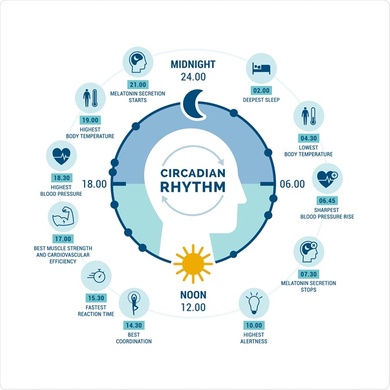How Your Circadian Rhythm Affects Your Health
Ever feel like you are on a never-ending hamster wheel?
From the moment you hit “snooze” on your alarm, it is time to hit the ground running! You wake up before dawn, work throughout the day while taking minimal breaks, and stay up way past your optimal bedtime. Maybe you find yourself having difficulty sleeping at night, whether it be falling asleep or staying asleep. Maybe you find yourself scrolling on your phone after the sun goes down, leading to excess blue light exposure.
If you lack a consistent sleep routine or feel fatigued throughout the day, these may be signs your Circadian Rhythm is out of whack. Not only can a disrupted circadian rhythm impact your energy levels and sleep, but it can also lead to constipation, increased blood pressure, hair loss, skin issues, anxiety, and brain fog. All of these symptoms can have a negative impact on your day to day life. If you have other underlying concerns, such as weight loss resistance, gut issues, or thyroid imbalances, these all can be hindered by a disrupted Circadian Rhythm.
What exactly is your Circadian Rhythm? How can you optimize it?Read below to learn more!
Circadian Rhythm 
Circadian Rhythm is an important process that we all can benefit from supporting on a daily basis. Circadian Rhythm is defined as a 24-hour cycle our bodies naturally follow that revolves around light. This biological process relies on certain cues, such as light, temperature, and meal timing. Going way back to the beginning of time, our ancestors rose with the sun and fell asleep around the time the sun went down for the day. In addition, they were hunters and gatherers, allowing for consistent meal intake throughout the day. This allowed them not only to stay in tune with the patterns of nature, but also to keep their Circadian Rhythms in check.
Flash forward to today: most of us are not consistent with our sleep routines (also known as sleep-wake cycles) or our meal timing. In fact, it is estimated that 1 in 3 American adults are constantly sleep deprived. In addition, about half of American adults report not getting enough sleep and feeling tired at least three days of the week. These disruptions to our Circadian Rhythm cues can have a major impact on our day to day life. Over time, they can lead to increased risk for developing certain chronic health conditions, such as obesity, type 2 diabetes, and certain cancers.
There are several factors that can impact our Circadian Rhythms
1. Hormones play a major role in regulating this cycle. Two key hormones play a role in our sleep wake cycle: melatonin and cortisol. Think of melatonin as the sleeping hormone, since it regulates sleep, and cortisol as the waking hormone, as it controls the timing of waking up and eating. The ratio of these hormones is constantly changing, depending on the time of day and certain lifestyle factors. However, if either of these hormones are out of balance, this can lead to irregular sleep patterns, such as sleeping during the day and trouble falling asleep or staying asleep at night.
2. Stress is commonly associated with the hormone, cortisol. Oftentimes, this hormone gets a bad rep. We need adequate amounts of cortisol produced by the adrenal glands in order to maintain daily functions. However, if we are constantly in a stressful state of being, whether it be a stressful job, relationship, or life event, this can cause our adrenal glands to overproduce cortisol. Eventually, if we do not make the lifestyle modifications necessary to lower cortisol, our adrenals will become burned out and lead to something known as adrenal fatigue.
Adrenal fatigue refers to the adrenals being unable to produce adequate cortisol, leading to lower than optimal cortisol levels. This condition not only impacts the adrenals, but the whole body, as well. Cortisol is a key player in the hypothalamic-pituitary-adrenal (HPA) axis, meaning if the adrenals are imbalanced, this leads to an imbalance in other organs throughout the body. It is important to note just how impactful high stress hormone secretion is on the body1. Regulating stress levels, whether they be emotional, dietary, or physical stressors, is key to restoring cortisol to baseline.
3. Poor diet. As mentioned above, inconsistent meal timing and consuming the Standard American Diet (SAD) can not only impact internal stress, but also can throw our Circadian Rhythms out of whack. Our ancestors relied on natural, whole-food sources for nutrition, not processed items lacking nutrient density and found in a bag or box at a grocery store. In addition, inconsistent meal timing, including skipping meals or irregularly eating/snacking throughout the day, can also disrupt this biological clock.
 4. Our nighttime routines are another factor that can impact our Circadian Rhythms. Instead of taking the time to wind down each night and limit screen time (also known as blue-light exposure), most of us find ourselves spending too much time on an electronic device and hastily trying to fall asleep each night. Blue-light exposure actually signals to our brains that it is still daytime and encourages our normal body processes that occur during the day to continue on well past the sun going down. The best way to limit blue-light exposure is to limit screen time at least 30 minutes to an hour before bed while using blue-light blocking devices, such as a quality pair of glasses throughout the day.
4. Our nighttime routines are another factor that can impact our Circadian Rhythms. Instead of taking the time to wind down each night and limit screen time (also known as blue-light exposure), most of us find ourselves spending too much time on an electronic device and hastily trying to fall asleep each night. Blue-light exposure actually signals to our brains that it is still daytime and encourages our normal body processes that occur during the day to continue on well past the sun going down. The best way to limit blue-light exposure is to limit screen time at least 30 minutes to an hour before bed while using blue-light blocking devices, such as a quality pair of glasses throughout the day.
5. The Gut! Not surprisingly, the gut also plays a role in Circadian Rhythm regulation. The Gut-Circadian Rhythm connection can be disrupted by three main aspects: gut dysbiosis, irregular eating patterns, and antibiotic use. Gut dysbiosis can signal to the Circadian Rhythm that something is off as far as gut microbiome composition of both good and bad gut bacteria. Antibiotic use, especially chronically, actually clears out both the good and bad bacteria in your gut, leading to decreased immunity and overall function of the beneficial bacteria.
 6. Sunlight exposure! Besides potentially modifying your nighttime routine and stress management, another beneficial lifestyle habit to make part of your routine is daily sunlight exposure. Some different ways to incorporate being outdoors into your day are reading, journaling, taking a walk, meditating, biking, or eating your meals outside. Although it is likely more feasible to get adequate sunlight in the summer months, it is also possible to get sunlight in the cooler months as well! Some great ways to do this include: red light therapy or a short morning walk or jog outdoors. One of the top things to avoid in the winter months is hibernating indoors. Even just 5-10 minutes of sunlight can help keep your Circadian Rhythm in check.
6. Sunlight exposure! Besides potentially modifying your nighttime routine and stress management, another beneficial lifestyle habit to make part of your routine is daily sunlight exposure. Some different ways to incorporate being outdoors into your day are reading, journaling, taking a walk, meditating, biking, or eating your meals outside. Although it is likely more feasible to get adequate sunlight in the summer months, it is also possible to get sunlight in the cooler months as well! Some great ways to do this include: red light therapy or a short morning walk or jog outdoors. One of the top things to avoid in the winter months is hibernating indoors. Even just 5-10 minutes of sunlight can help keep your Circadian Rhythm in check.
Key Nutrition Strategies
Now that we have discussed Circadian Rhythm and the role this internal clock may play in managing our mood, let’s dive into some important nutritional components linked to improved overall well-being.
Overall Diet Quality
Diet quality plays a huge role not only with our digestion and risk for various chronic diseases, but also our mood. As mentioned above, the Standard American Diet (SAD) is full of processed foods and lacks the nutrient variety that our body needs. In fact, multiple studies have studied the impact of the American diet on brain function. One study in particular found that high calorie foods (which are most commonly consumed as processed foods) decrease neuronal plasticity, a key component of learning and memory.
On the other hand, a randomized controlled trial (RCT) performed in 2019 focused on a Mediterranean-style diet for those with moderate to severe depression. A Mediterranean diet is well-known for being anti-inflammatory and involves consuming a variety of whole foods. After 12 weeks, participants who focused on the Mediterranean diet had improvement of symptoms using a standardized depression rating scale. This study emphasizes the importance of diet quality!
Choosing a variety of anti-inflammatory whole foods, such as fruits, vegetables, and minimally processed protein options, not only improves your gut, but also has a direct impact on your Gut-Brain Axis.
Key Food Groups to Try to Limit for Inflammation
- Added sugars
- Processed foods (especially those with inflammatory seed oils)
What you should focus on:
Omega-3 Fatty Acids
Omega-3’s are another important anti-inflammatory nutritional component. Two of the main types of omega-3’s, eicosapentaenoic acid (EPA) and docosahexaenoic acid (DHA) actually work to bring down the inflammatory response in the brain by decreasing several proinflammatory cytokines6. These proinflammatory cytokines, if left unmanaged, have been linked to mood disorders, such as depression and anxiety.
One study on healthy American adults found that a daily dose of 5 grams of EPA + DHA combined reduced not only proinflammatory cytokines but also significantly reduced a critical fatty acid ratio, arachidonic acid (AA) to EPA7. The AA/EPA ratio is critical in measuring the levels of pro-inflammatory fatty acids, such as AA, to anti-inflammatory fatty acids, such as EPA.
Some of the common food sources of omega-3 fatty acids include: fatty fish, such as salmon, mackerel, tuna, and herring; avocados, and certain nuts and seeds, such as chia seeds. If these foods are not able to be consistently part of your diet, supplementation may be necessary. Similar to Vitamin D, it is important to check your fatty acid levels prior to supplementation to determine the dosage needed, as well as the AA/EPA ratio. Lab testing can be performed by a licensed healthcare professional, including our functional lab testing at RSN.
Vitamin D
Vitamin D, also known as “the sunshine vitamin,” is another important micronutrient to include in the diet. This vitamin can be obtained through the sun. However, it is estimated that at least 35% of American adults are deficient in Vitamin D5. Vitamin D has many important functions, including bone and muscle health, mood, and supporting energy levels. If deficient in Vitamin D, various symptoms can occur, including joint pain, muscle cramping, fatigue, and mood changes (including depression)5.
Several foods are common sources of Vitamin D, including: salmon, tuna, egg yolk, and mushrooms. For some people, supplementation of this vitamin may be necessary, especially if daily sunlight exposure is not an option. However, before beginning supplementation, it is critical to have your Vitamin D level checked. Lab testing should be done and overseen by a licensed healthcare professional. After your Vitamin D level is established, you and your healthcare provider can determine whether supplementation is necessary.
B Vitamins
There are a wide variety of B vitamins, each with their own unique purpose.
The B vitamins specifically linked to brain health include: cobalamin (B12), pyridoxine (B6), thiamine (B1), and folate (B9)8. Let’s break each of these down into more detail:
-
- Vitamin B12
- Function: important in neurogenesis, homocysteine metabolism, overall cognition, and making the myelin sheath for neurons (remember those neurotransmitters?)
- Food Sources: meat, eggs, tempeh, dairy products, nutritional yeast
- Vitamin B6
- Function: important for making neurotransmitters, homocysteine metabolism
- Food Sources: legumes, fish, poultry, dark leafy greens, bananas
- Vitamin B1
- Function: brain glucose metabolism, protects cognitive function in times of stress; deficiency has been linked to dementia
- Food Sources: nuts, liver, rice, legumes, steak, tuna, and acorn squash
- Vitamin B12
-
- Vitamin B9
-
-
- Function: assists B12 in homocysteine metabolism, plays a part in making neurotransmitters, and helps repair neurons
- Food Sources: legumes, cauliflower, broccoli, dark leafy greens, liver, beets, brussel sprouts
-
Maintaining a nutrient-dense diet is critical to not only support your physical body, but also your mental state as well. Each of these micronutrients, in combination with an anti-inflammatory diet, can support a healthy mindset and minimize symptoms related to a disrupted Circadian Rhythm. Morning and nighttime routines are extremely important in order to optimize your body’s natural clock. By starting your day off with some form of mindfulness, such as meditation, prayer, journaling, or reading, you can help to keep your body’s stress levels in check. In addition, having a solid nighttime routine, including limiting screen time, can also benefit your Circadian Rhythm to begin winding down for the day. In summary, eating a wide variety of whole foods, moving your body daily, and taking care of your mind through daily mindfulness (including therapy!). All of these work together to achieve an overall healthy lifestyle.
If you would like to book a FREE 30 minute call click here. We would love to help you get to the root cause to look and feel your best!
References:
- https://kresserinstitute.com/gut-circadian-rhythm-connection/
- https://www.sleepfoundation.org/how-sleep-works/sleep-facts-statistics
- Morin JP, Rodríguez-Durán LF, Guzmán-Ramos K, et al. Palatable Hyper-Caloric Foods Impact on Neuronal Plasticity. Front Behav Neurosci. 2017;11:19. Published 2017 Feb 14. doi:10.3389/fnbeh.2017.00019
- Jacka FN, O’Neil A, Opie R, et al. A randomised controlled trial of dietary improvement for adults with major depression (the ‘SMILES’ trial) [published correction appears in BMC Med. 2018 Dec 28;16(1):236]. BMC Med. 2017;15(1):23. Published 2017 Jan 30. doi:10.1186/s12916-017-0791-y
- https://my.clevelandclinic.org/health/diseases/15050-vitamin-d-vitamin-d-deficiency
- Larrieu T, Layé S. Food for Mood: Relevance of Nutritional Omega-3 Fatty Acids for Depression and Anxiety. Front Physiol. 2018;9:1047. Published 2018 Aug 6. doi:10.3389/fphys.2018.01047
- NaPier Z, Kanim LEA, Arabi Y, et al. Omega-3 Fatty Acid Supplementation Reduces Intervertebral Disc Degeneration. Med Sci Monit. 2019;25:9531-9537. Published 2019 Dec 14. doi:10.12659/MSM.918649
- https://chriskresser.com/how-to-optimize-your-brain-for-better-cognitive-performance/

Rachel Scheer is a Certified Nutritionist who received her degree from Baylor University in Nutrition Science and Dietetics. Rachel has her own private nutrition and counseling practice located in McKinney, Texas. Rachel has helped clients with a wide range of nutritional needs enhance their athletic performance, improve their physical and mental health, and make positive lifelong eating and exercise behavior changes.
Read This Next
Micronutrients, or the vitamins and minerals your body needs, typically work like a team. To…
If you want to improve gut health, or even optimize your overall health, you’ve probably…
Have you ever found yourself grappling with the discomfort of abdominal distension, bloating, or cramping,…



